 Harmony Holiday
Harmony Holiday
For the reckless rapper, a fearless leap, no matter the landing.
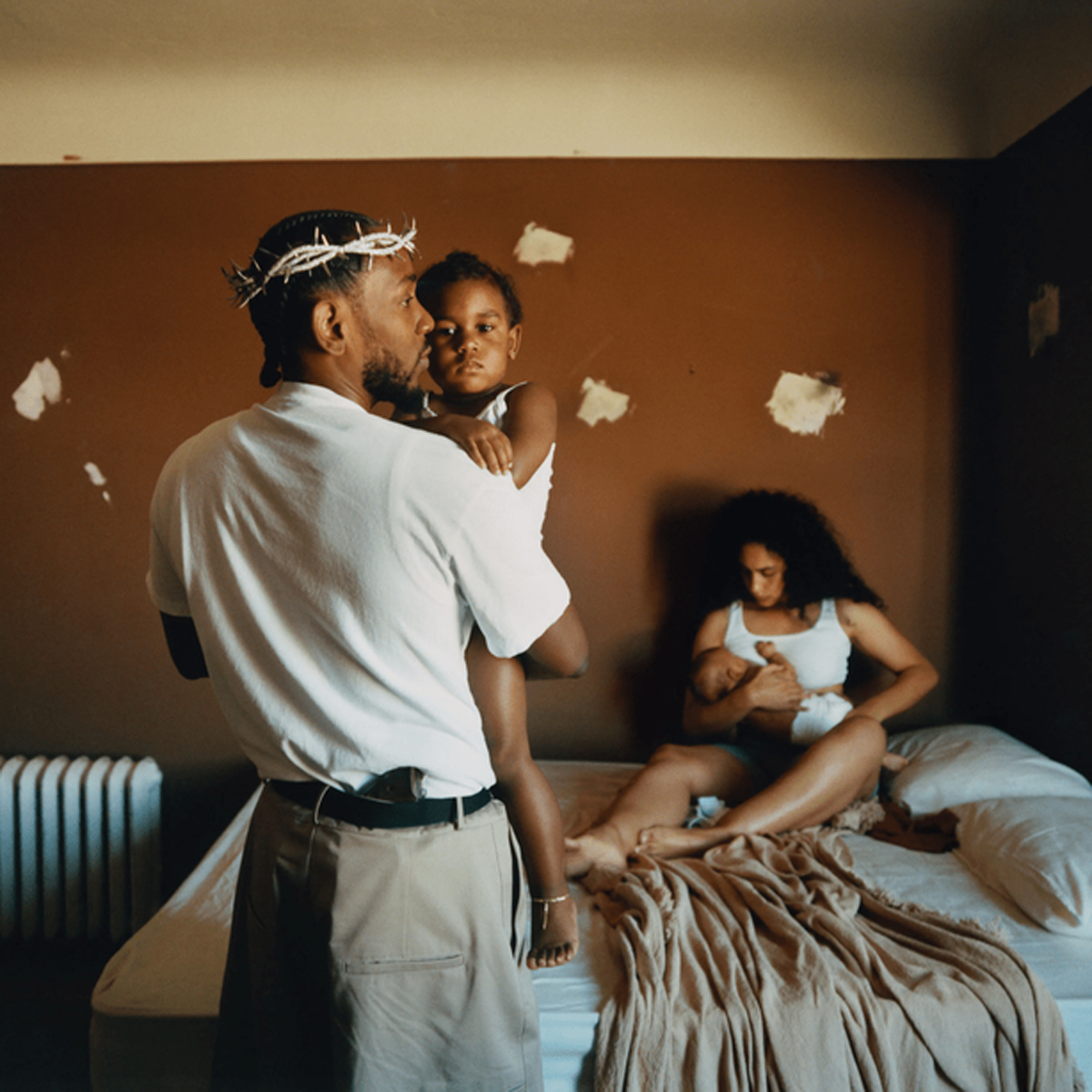
Mr. Morale & the Big Steppers, by Kendrick Lamar,
pgLang / Top Dawg Entertainment / Aftermath / Interscope Records
• • •
Think of John Coltrane’s Giant Steps (1960) as the distant analog to Kendrick Lamar’s Mr. Morale & the Big Steppers, the script of a leap that shatters midair. Ground yourself in the long legacy of such creative leaps, moments of suspended animation that allow musicians to reject adoration and explore their shadows, their transgressive edges, their new sounds, and the blank slate that comes when an artist exhausts his predictable muses. In Coltrane’s case, he was trying to rewrite the laws of collective improvisation and expand the range of the solo in jazz, so that phrases could say more. In Lamar’s case, he wants to divulge more of the self in a genre that rewards bragging above all else. The effect is a diminutive quality, a sunken sound that pursues that narrowing inversion of focus in defiance of the grandiose and didactic.
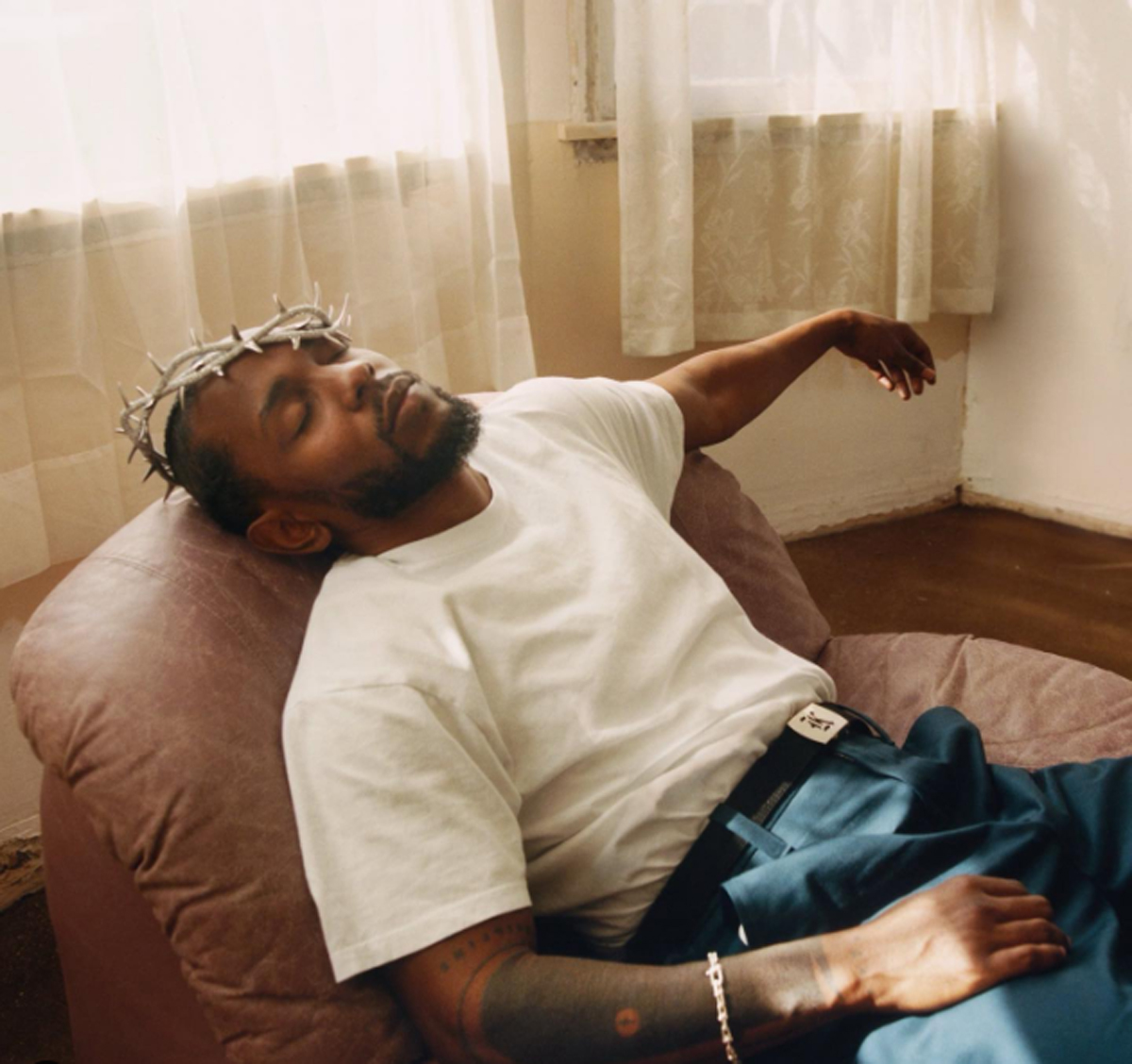
Kendrick Lamar. Courtesy Top Dawg Entertainment.
In ballad-like cadences, Lamar unravels the ornate, the godlike, gangsterism, praise, his alter ego, sainthood, saviorism, the romanticizing of his gifts, and the erasure of his generational curses, all in effort to refashion himself as a well-meaning villain. One of his first lines retaliates against pathos. It could be I’ve been going through something, feel sorry for me, but instead he deflects, I’ve been going through something, be afraid. He carries his ache like a weapon instead of a victim story. After his stark announcement, he riddles: what is a woman that really hurt, a demon you’re better off killing her. His wounds lash out like threats he hopes deal him an intrepid and ruthless air, or at least keep him intimidating enough to hush detractors. He wants the aspects of his psyche that taunt and frighten him to make him invincible instead of relatable, vulnerable, or worse, trite. He intends to incite controversy, lamenting on “Worldwide Steppers,” Niggas killed freedom of speech, everyone sensitive. Does his costume hubris prevail? Or does it fail on purpose, sacrificing itself to become a great fable in the arsenal of cautionary tales about the dangers of becoming famous before resolving your inner conflicts? Before the sobering effects of healing is the only time anyone is brave enough to get onstage as naked as one must to become famous, however. And this paradox, which leaves so many trapped in a spotlight that outshines their souls, is the subject of Mr. Morale’s disillusioned vision. Where in the past Lamar deified himself to speak, here he makes us listen as a mortal man’s demons break loose from their celestial refuge.
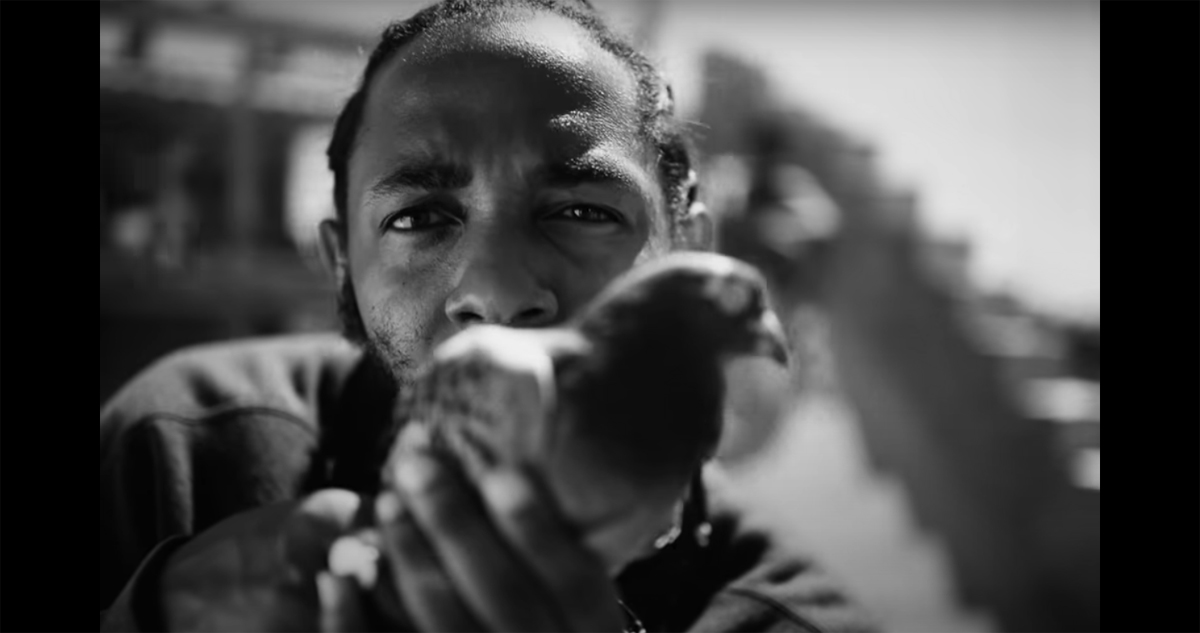
Still from music video for “N95.”
This is his music of disinheritance, a series of eulogies for mythic versions of himself whose skeletons tap-dance backstage like the ever-approaching slayer who propels a horror movie forward. What we’re left with risks sounding uninspired because it refuses to deliver familiar highs, it refuses showmanship, refuses to conquer, or assure us we’ll be alright, and insists on dangling agony the way previous Lamar albums did comfort, high concepts, and potential redemption. Fame has etched an immutable scar he flaunts and accuses fans and family of inflicting. On “Savior” he offers a scorned litany of all the rappers who can’t save the world despite their verbal dexterity. It’s a resentment to flatter the collective rap ego because no one is expecting him to save them—rappers are inadequate messiahs. The pressure Lamar feels is self-imposed. After five years of contemplative retreat, he’s proven he can shake the urge to be a redeemer. Mr. Morale asks, will Lamar be more effective if he rescues himself first?
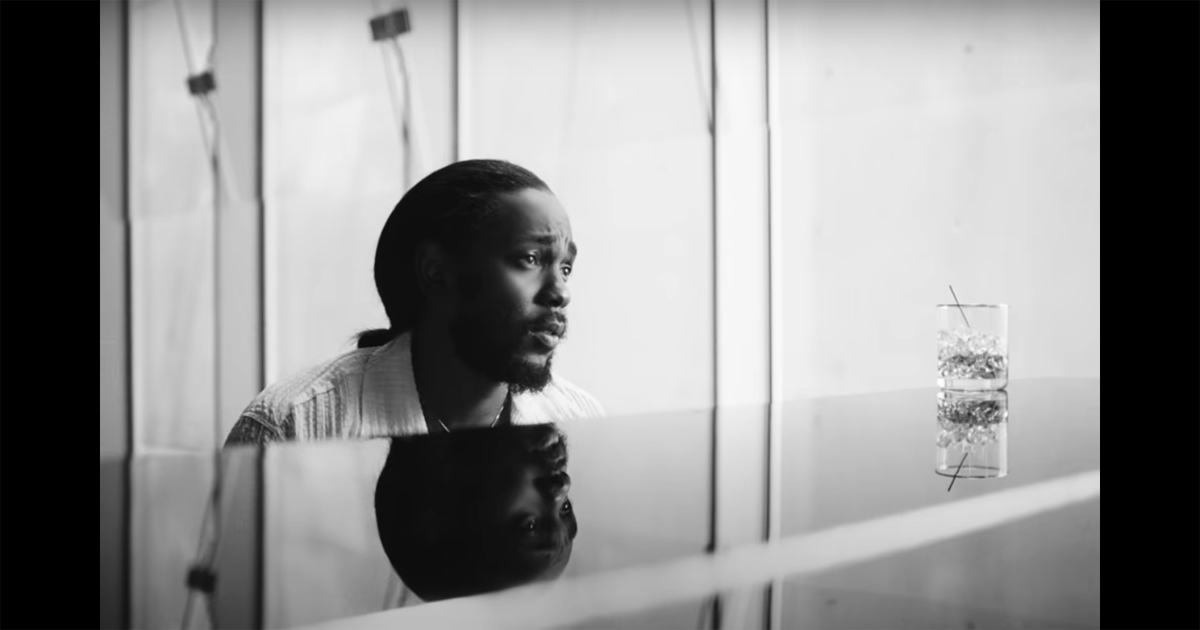
Still from music video for “N95.”
The inquiry arrives in a form that’s more theatrical than purely musical. Dejected piano bars replace beats throughout the album, separating dramatic acts. Lamar raps to outwit and surrender to both trauma and privilege simultaneously. He’s intent on re-centering himself after having been showered with the amenities of the prestige-making machine and embraced by virtue signalers who love and claim his music but might reject him if he divulged the uncouth attitudes that inspire it. He becomes intentionally reckless. He’s disoriented. He wants to be the worst man in the world, gloating on “Worldwide Steppers,” I’m a killer, he’s a killer, she’s a killer and adding I am not for the faint of heart, all over a blurry beat that sounds Basinski-esque, like the drums are disintegrating loops of his pain. He negates himself into self-actualization track by track, as if there’s nowhere left for him otherwise. He’s been colonized by acclaim. It seems like he blames women most, the ones who inspire his murderous disdain at the top of the album, the ones who foment the lust and infidelity he confesses throughout, the ones who enable him with unconditional understanding, like his partner, Whitney, whose voice accompanies him throughout the album, and the white women he revenge-fucks like a reincarnation of Eldridge Cleaver’s dream with a softer edge in that there’s consent here. He’s burdened by all the consent, he can have whatever he wants, and this impunity is obscuring his true needs, inscribing synthetic ones on his heart, and making his music less his own.
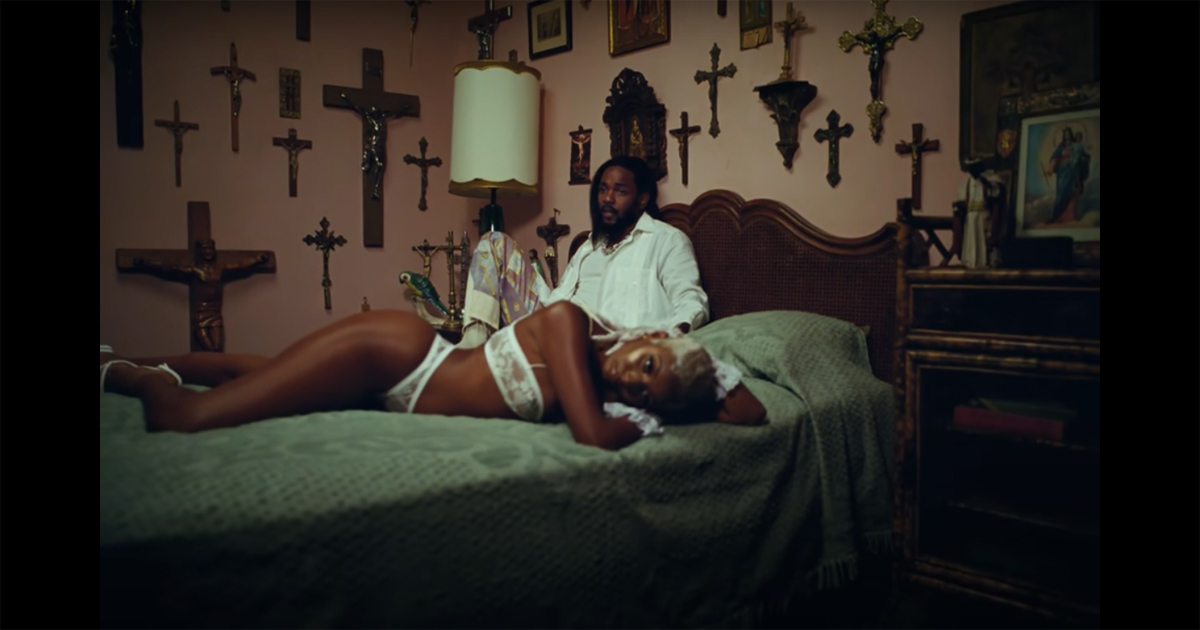
Still from music video for “N95.”
The tension in Mr. Morale’s themes suggests Lamar is unsure when he’s pandering to what’s expected of him and when he’s being real. So he digs deeper, snitches a little on his family members while blaming himself for what he’s internalized from them—I got daddy issues, that’s on me. Where in DAMN., he preached about the loyalty and royalty in his DNA, on Mr. Morale he laments inherited dysfunction. Struggle is no longer regal. He refrains I grieve different and means he has a therapist now and expensive cars, but the same compartmentalized feelings. He’s matured in that he’s asking for help, learned he’s worth saving. Mr. Morale places therapy where religion once was on previous albums, as a potential salve, a new paradigm he wants to accept and outgrow. In the past he’s reveled in the pleasure of his many wounded selves lyrically, giving each one a cadence and a heartbeat. Here he’s punishing and ascetic, denying himself the momentum of those sonic hiding places. The sunken sound is the sound of pathologizing his past, and penance, a blues hue where the dalliance once lived in his vocal tone. It’s also a renovated sense of purpose. He has children of his own now, they’re on the album’s cover and all over it in cameos and lyrics reminding us why his growth is urgent.
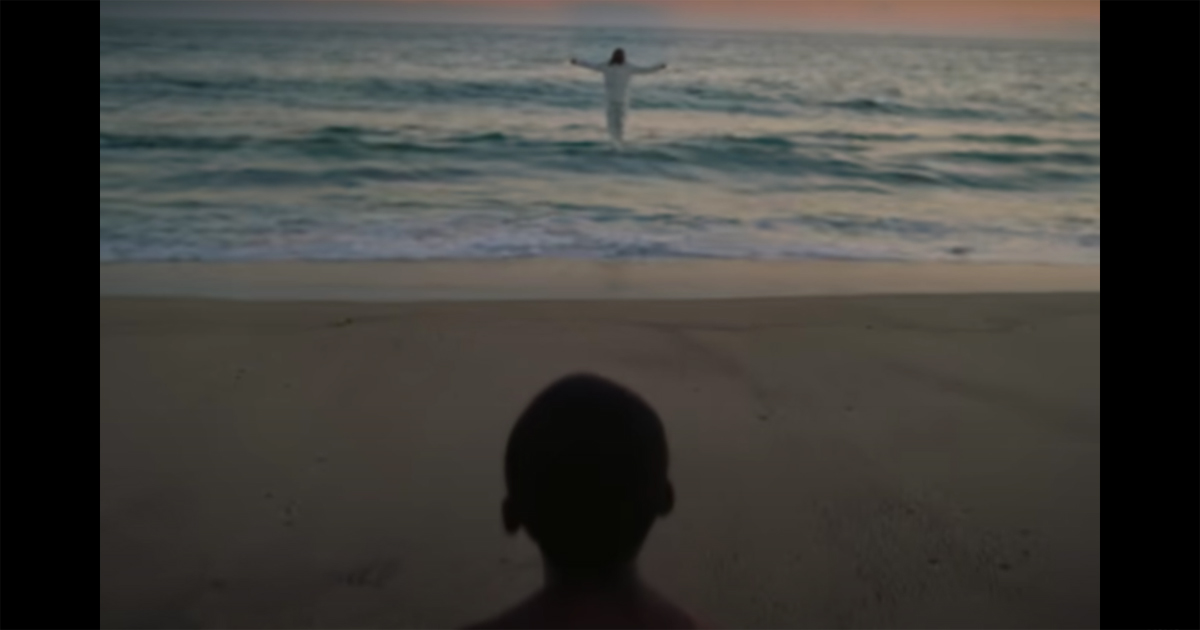
Still from music video for “N95.”
He wears his former muzzle like a megaphone, sharing the parts of himself that appease no one. The messianic is incompatible with domesticity, so that his closing refrain I choose me, I’m sorry, is his fulfilling of the prophecy on To Pimp A Butterfly’s “Mortal Man,” that tells us growing up induces reclusiveness and timidity where the brave outspoken soul once lived. He samples Tupac declaring you don’t see any loud-mouthed thirty-year-old motherfuckers. Lamar has traded outrage for ennui. Will he prove that quiet introspection is as militant as protest music, or is his call on Mr. Morale to take off your idols part self-annihilation, a promise to disappear and reemerge with a new personal rubric for greatness every few years? With this muted exasperation and self-revelation, somewhere between building intimacy and trauma-bonding with his listeners, in places too spot-on candid, in others intentionally stumbling, like where he slurs faggot into oblivion on a tribute to transgender relatives, the love here knows it’s part toxic, doesn’t pretend to be the agape love of DAMN. Mr. Morale is the muse who tries to be inadequate on purpose so you’ll get over him. It backfires, now we’re trauma-bonded to a rebel poet we can’t quite pin down, a star with no pattern but light.
Harmony Holiday is the author of several collections of poetry and numerous essays on music and culture. Her collection Maafa came out in April.